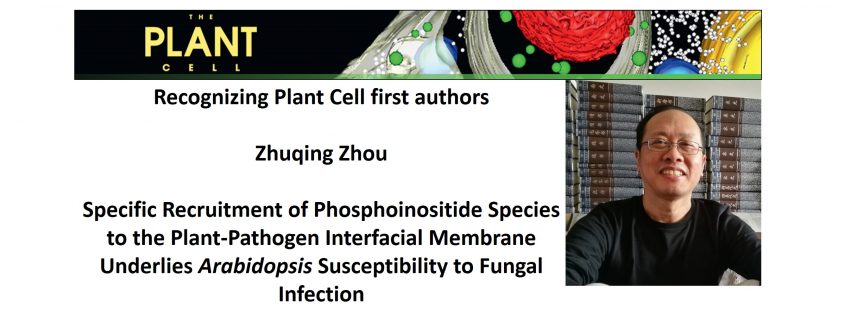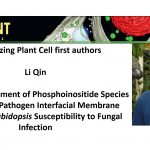Recognizing Plant Cell authors: Zhuqing Zhou
Zhuqing Zhou, co-first author of Specific Recruitment of Phosphoinositide Species to the Plant-Pathogen Interfacial Membrane Underlies Arabidopsis Susceptibility to Fungal Infection
Current Position: Professor, Cell and Developmental Biology, College of Life Science and Technology, Huazhong Agricultural University, Wuhan, China
Education: Master and Ph.D. in Agronomy, Huazhong Agricultural University
Non-scientific Interests: reading, running and traveling. special interest in Chinese history
Brief bio: When I was a Ph.D. student, my study was focused on investigating the relationship between the endosperm development and transportation/accumulation of photosynthetic metabolites in wheat caryopsis. In 2002, I conducted my postdoctoral research in Prof. Shengyin Lan’s laboratory at the College of Life Sciences and Technology, Huazhong Agricultural University. The research project aimed to understand the molecular mechanisms underlying the programmed cell death (PCD) during the endosperm development in wheat and rice caryopsis. In 2004, I started to run my own Cell Biology Laboratory. My research interests are primarily focused on: (1) the molecular mechanism and cytological characteristics of the PCD involved in development of sieve elements of wheat caryopsis; (2) the PCD process and regulating signal pathways in endosperm development of wheat under abiotic (waterlogging) stress; and (3) the interactions between reactive oxygen species and autophagy in wheat and Arabidopsis root cells under low oxygen stress. The specialty of my laboratory is the study of cellular ultrastructures, and the cytochemical and immunocytochemical localizations and function analysis of biological macromolecules. In 2013 and 2015, as a visiting scholar, I worked twice at Prof. Yangdou Wei’s laboratory at the University of Saskatchewan. We explored the cellular and molecular mechanisms underlying the Arabidopsis – pathogen interactions involving the clubroot (Plasmodiophora brassicae) and powdery mildew (Erysiphe cichoracearum) pathosystems. We found that the specific phosphoinositides accumulated at the interfacial membrane between host plants and fungal pathogens and regulated plant disease development during the powdery mildew infection on host Arabidopsis.
姓名:周竹青
当前职位:教授, 华中农业大学
教育经历:华中农业大学农学系,硕士和博士。2000年获农学博士学位
兴趣爱好:跑步,旅行,阅读。特别爱好中国历史
个人简介:在博士生阶段主要研究小麦颖果胚乳细胞发育与光合同化物运输和积累之间关系。2002年在华中农业大学生命科学技术学院兰盛银教授的分子细胞实验室做博士后研究工作,继续从事小麦和水稻胚乳发育PCD分子机制研究。2004年自已主持细胞生物学实验室工作。我们研究的兴趣主要聚中于:(1)小麦韧皮部筛分子发育过程中细胞程序性死亡的细胞学特征和分子机制;(2)非生物(淹水)下,小麦胚乳细胞PCD进程和调控的信号通路;(3)低氧协迫下小麦和拟南芥根细胞中活性氧与细胞自噬相互调控关系。我们实验室的特长在于:细胞超微结构研究,生物大分子的细胞化学和免疫细胞化学定位和功能分析。2013年和2015年作为访问学者两次到加拿大萨斯喀彻温大学 (University of Saskatchewan) Dr. Yangdou Wei的分子病理实验室开展合作研究,以寄主拟南芥,及十字花科根肿菌(Plasmodiophora brassicae)和白粉菌(Erysiphe cichoracearum)为材料,研究植物与病原菌互作的细胞和分子机制。发现在白粉菌侵染拟南芥过程中,特殊的磷酰肌醇分子会在植物与真菌互作膜上聚积,并调控植物病害发展。立足于以上发现的实验结果,我们完成了本论文。




